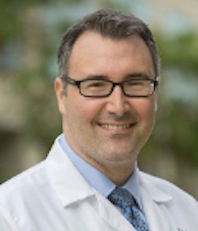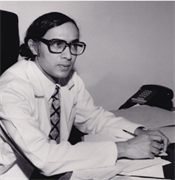Q & A with David Lazar
 Dr. David Lazar is a pediatric surgeon and assistant professor of surgery at UC San Diego. A graduate of UCSD’s general surgery residency program, he specializes in prenatal counseling and intervention; caring for children with thoracic and abdominal congenital anomalies; and extracorporeal membrane oxygenation. In this interview, he talks about what it’s like to work with kids—and parents; shares new goings-on in the Division of Pediatric Surgery; and recounts the time he played black jack with former Department chair, Dr. A.R. Moossa.
Dr. David Lazar is a pediatric surgeon and assistant professor of surgery at UC San Diego. A graduate of UCSD’s general surgery residency program, he specializes in prenatal counseling and intervention; caring for children with thoracic and abdominal congenital anomalies; and extracorporeal membrane oxygenation. In this interview, he talks about what it’s like to work with kids—and parents; shares new goings-on in the Division of Pediatric Surgery; and recounts the time he played black jack with former Department chair, Dr. A.R. Moossa.
May 17, 2018 | Interview by Lindsay Morgan
As a pediatric surgeon, you work with fetuses before delivery, all the way through to newborns, infants, children, adolescents and teenagers. How is working with babies and kids different than working with adults?
We learn how to form bonds and build rapport with children and their families and gain their trust, which is a little different than adults. I also think that what attracts us to pediatric surgery is not necessarily the pathology of the disease, or even the delicate nature of the surgery—although that’s part of it. But the main thing is the emotional connection with families and the gratification we get taking care of children. Kids are full of energy, and life and hope. All they want to do is get better so they can go outside and play. They’re special to take care of.
Why did you decide to go into medicine?
I knew from a young age that I liked science. When I was 14, my grandmother got sick with cancer. She moved in with my father and I, and we took care of her. I’d go to doctor visits, and she was having operations. My grandmother was one of the most important influences on my life. She was so strong and resilient during this time. I realized that being a physician was a potentially good way to link an interest in science with passion for taking care of people.
Fast forward to med school, where I shadowed a family friend who was an orthopedic surgeon and who happened to operate on a couple of my family members. I thought surgery seemed really cool. Being able to instantly help somebody and doing it with your hands was very appealing to me. Then I spent a couple months doing plastic surgery, predominantly in a children’s hospital. I couldn’t get excited about the cosmetics stuff, but I really liked having the kids as patients. So, I spent more time doing pediatric general surgery and that’s what I fell in love with.
It’s a special role—you have the potential to make such a mark on kids. I think everyone can remember their childhood doctor.
The bigger thing is actually the impact the kids have on us. With each one of the kids I’ve worked with, I can tell you exactly what they had, and the surgeries they had, and taking care of them afterwards. They have a huge impact on me.
When you meet a new patient and their family is there, what is that like when you walk into the room?
There’s a degree of unknown and anxiety and fear . Part of my job is to deescalate everything and provide a sense of comfort. And part of my job is to educate: to teach them what the problem is and how we’re going to fix it.
The stress must take a toll on parents.
Being a father has really helped me connect with parents. I freely share that I have two little girls, both of whom have gone to the operating room. I think that gives me some street cred, that they can trust me, but also it helps me know what they’re going through. I know what it feels like to be powerless and vulnerable, when all you want to do is to switch places, and have the surgery yourself instead of your kid.
Having kids of your own and seeing the challenges some of them face— does it make you worry all the time about all the potential things that can happen to your own girls? Or are you just grateful all the time that your kids are healthy?
My wife worries all the time, so I don’t have to. But I’m constantly grateful. From the day we had the second trimester ultrasound, I’m just grateful. Every day that they’re healthy is a gift.
After medical school at Baylor College of Medicine, you came to UC San Diego for general surgery residency, and subsequently completed your pediatric surgery fellowship at Texas Children's Hospital, before returning to UCSD as faculty. What drew you to San Diego—besides the weather?
The personality of UCSD was exactly my personality. It was a work hard, play hard environment. You were expected to come in early, stay late, take great care of the patients. But at the same time, San Diego was your playground, and the residents had a lot of fun. They were genuinely friends.
Who were some of your key mentors?
Probably the biggest influence was Dr. Moossa, the former chair of the Surgery Department, who passed away in 2013. He was a notoriously tough guy. He liked to smoke cigars, he liked to go to the track, and he liked to play black jack. One day on rounds when I was an intern, my chief resident, who knew I liked those things too, told Dr. Moossa that I liked to play black jack. Dr. Moossa, who was born in the French part of Mauritius and did his training in Europe, said:
—You like to play black jack? [Dr. Lazar recounts this scene in a bad French accent.]
— I said: yes sir, I do.
—And he said: Well let me ask you a question. If you have a 12 and the dealer is showing a 2, what do you do?
—And I thought about it and said: Well, I’m gonna stay Dr. Moossa.
—And he’s said: No! You hit!
 The next week on rounds he asked me if I would like to come play black jack with him. I said: absolutely I will! I put on a suit and tie, and picked him up in a parking lot in Rancho Santa Fe—he was wearing jeans and a polo shirt—and we drove to Pala Casino. And for hours, we played black jack, had a steak dinner, and he schooled me about black jack and surgery and cigars and it was amazing.
The next week on rounds he asked me if I would like to come play black jack with him. I said: absolutely I will! I put on a suit and tie, and picked him up in a parking lot in Rancho Santa Fe—he was wearing jeans and a polo shirt—and we drove to Pala Casino. And for hours, we played black jack, had a steak dinner, and he schooled me about black jack and surgery and cigars and it was amazing.
In 2013, he was diagnosed with liver cancer, and myself and the residency program director at the time, David Easter, helped take care of him in those last few months. It was really special.
Dr. Easter is an amazing guy, an amazing surgeon. I wish he could teach residents forever. I also spent a lot of time with Dr. Lowy and he is just perfect. In the OR. Out of the OR. In research, life, everything. If you told me I had to stay in residency forever my only stipulation would be to spend that time with Dr. Lowy.
What was it like to come back as faculty in August 2016?
It felt crazy. I remember the day I went to the badging office in Hillcrest to get my badge—it was the same place I went in 2007 as an intern. It was just surreal. And I put it on and it said faculty. I mean, it was nuts.
What are some of the most interesting new things happening in your Division?
In June, we’re graduating the second accredited pediatric surgery fellow in our department’s history—Dr.Bhargava Mullapudi. He will be faculty at Cincinnati Children’s, which is one of the top three children’s hospitals in the country. We also recently joined the Western Pediatric Surgery Research Consortium—a multi-institution collaborative aimed at pooling data on rare pediatric diseases to optimize care through research. To this end, we’ve also hired a new full- time research coordinator,Sneha Nicholson, who we’re really excited to add to the team. It’s exciting times in our division.
Have you ever had a day at work that was so hard, you thought: I’m not sure I want to do this anymore?
I’ve definitely had my share of complications. And I’ve had a couple of children pass away, usually because of the disease, whether it’s trauma or cancer. It’s emotionally very tough. But I’m super lucky. I have my perfect job. It’s absolutely perfect. I’ve never had a day where I was like: oh my god, I don’t want to do this anymore. Never. It’s never crossed my mind. I’ve had lots of jobs—delivering pizza, being a tennis instructor, busing tables—and times when I’ve dreaded going to work. But I’ve never done that in surgery, even as a resident.
Maybe one day I’ll decide to become a guidance counselor so I can help people figure what they’re passionate about.
